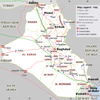Search Results
- All results (2429)
- Customs (9)
- Resources (239)
- Standards (15)
- Organisations (2040)
- News (22)
- Stories (75)
- Quotes (11)
- Guidelines (1)
- Q & A (7)
- Videos (3)
United Nations Assistance Misssion for Iraq (UNAMI)

The United Nations Assistance Misssion for Iraq (UNAMI) hosts a web portal for UN agencies and NGOs working in Iraq.
Fighting Poverty: A Business Opportunity - Report on the 10th International Business Forum

Fighting Poverty: A Business Opportunity - Report on the 10th International Business Forum, a conference report, provides a summary of the Forum's proceedings in respect to how business is addressing the Millennium Development Goals.
Food Aid Logistics Operational Handbook

Food Aid Logistics Operational Handbook, produced by the Commodity Management Enhancement Project, is designed to provide logistics managers and NGO program staff with basic information and guidance in planning and establishing a supply chain to deliver food aid. The focus of this handbook is...
European Foundation Centre Principles of Good Practice

The European Foundation Centre (EFC) Principles of Good Practice represent a shared vision of good practices and constitute a general recommendation to reinforce good practice, openness and transparency in the European foundation community. As such, they are intended to be of application both...
Being Good at Doing Good? - Review of Debates and Initiatives Concerning the Quality of Humanitarian Assistance
Being Good at Doing Good, a conference paper, attempts to do justice to the diversity among humanitarian organisations and individuals. Issues discussed include approaches to the quality of humanitarian assistance, the use of standards, methods to enhance quality and accountability and...
ReliefWeb - Togo
A UN project serving the information needs of the humanitarian relief world. Includes a country-by-country guide, with an entry for Togo. It provides the latest updates about the country and its humanitarian situation.
Beyond the continuum: The changing role of aid policy in protracted crises

This report, the third in the Humanitarian Policy Group's annual series looking at trends in the international humanitarian system, focuses on the increasing engagement of the international development aid system in situations which have traditionally been seen as the preserve of the humanitarian...
UNICEF Corporate Partnerships - Examples
UNICEF Corporate Partnerships - Examples, a series of web pages, details UNICEF's corporate partnerships with a range of companies.
ACFID Code of Conduct
The ACFID Code of Conduct is a voluntary, self regulatory industry code for non government development organisations.
International Health Relief Assistance - Recommendations Approved at the Meeting of International Health Relief Assistance in Latin America

International Health Relief Assistance - Recommendations Approved at the Meeting of International Health Relief Assistance in Latin America, a summary document, sets forth recommendations designed to make international health assistance more effective, in both substance and timing, to the real...
Relief Competency Standards

The Relief Competency Standards are part of the Humanitarian Relief Training Package guidelines developed by World Vision to assist in increasing the capacity of relief workers in nations around the globe The Assessment Guidelines describe the assessment arrangements for determining whether an...
Quality and Accountability Initiatives: Questions and Answers

Quality and Accountability Initiatives: Questions and Answers, a web resource page, speaks to four of the most widely known inter-agency initiatives to improve accountability, quality and performance in humanitarian action: Active Learning Network for Accountability and Performance in Humanitarian...
Handbook for emergencies, second edition

Effective emergency preparedness and response is a major priority of UNHCR. Crises have caused widespread human suffering and put great demands on UNHCR, prompting them to develop an effective response mechanism. Having dispatched over 300 missions throughout the world since 1992, UNHCR now has in...
Guidelines for Emergency Humanitarian Assistance Project Proposals and Reports

The Guidelines for Emergency Humanitarian Assistance Project Proposals and Reports are for agencies seeking emergency funds to support short-term international humanitarian assistance. The guidelines clarify the types of projects for which they have been developed (ie. short-term responsive...
Cash and vouchers in emergencies

This paper is the final product of a three-year research project looking into when the option of giving people money instead of, or as well as, in-kind assistance is feasible and appropriate. A strong body of evidence is starting to emerge to indicate that providing people with cash or vouchers...
The politics of principle: the principles of humanitarian action in practice

This report is the synthesis report of an independent study by ODI into humanitarian principles. In recent years there has been an outpouring of reflection on principles by humanitarian agencies, and attempts in several countries by groups of agencies to develop a more explicitly ‘principled’...
AlertNet - The Diary
AlertNet is a humanitarian news network. It aims to keep relief professionals and the wider public up-to-date on humanitarian crises around the globe. AlertNet has a network of more than three hundred contributing humanitarian organisations and its weekly email digest is received by more than...
Code of Conduct for NGOs engaged in Humanitarian Action, Reconstruction, and Development in Afghanistan
Code of Conduct for NGOs engaged in Humanitarian Action, Reconstruction, and Development in Afghanistan is aimed at promoting improved understanding of NGOs in Afghanistan, their purposes, and their accomplishments among the general public, government, donors and the media. The principles of...
Iraq Map

The UN Iraq map site shows authorised entry points into Iraq for humanitarian supplies. The map is provided by the UN Oil for Food Programme.
ACT Guiding Principles on Material Aid

ACT Guiding Principles on Material Aid, a policy guide, outlines ACT International's principles on material aid donations, the responsibilities of donors and implementing ACT members, and specifications relating to particular material aid categories.

